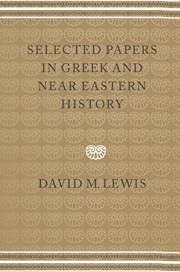Book contents
- Frontmatter
- Contents
- List of plates
- Preface
- Systems of reference
- GENERAL
- ATHENIAN
- 9 Public property in the city
- 10 Cleisthenes and Attica
- 11 Review of J. S. Traill, The Political Organization of Attica
- 12 Review of P. Siewert, Die Trittyen Attikas und die Heeresreform des Kleisthenes
- 13 The Kerameikos ostraka
- 14 Megakles and Eretria
- 15 The Athenian Coinage Decree
- 16 Athena's robe
- 17 The treaties with Leontini and Rhegion
- 18 Entrenchment-clauses in Attic decrees
- 19 Apollo Delios
- 20 After the profanation of the Mysteries
- 21 Aristophanes and politics
- 22 Who was Lysistrata?
- 23 A note on IG i2114 [= i3105]
- 24 The epigraphical evidence for the end of the Thirty
- 25 The financial offices of Eubulus and Lycurgus
- 26 The dating of Demosthenes' speeches
- 27 Law on the Lesser Panathenaia
- 28 The Athenian Rationes Centesimarum
- 29 The chronology of the Athenian New Style Coinage
- 30 Review of M. Thompson, The New Style Silver Coinage of Athens
- NEAR EASTERN
- Bibliography
- Publications of David M. Lewis
- Indexes
20 - After the profanation of the Mysteries
Published online by Cambridge University Press: 15 January 2010
- Frontmatter
- Contents
- List of plates
- Preface
- Systems of reference
- GENERAL
- ATHENIAN
- 9 Public property in the city
- 10 Cleisthenes and Attica
- 11 Review of J. S. Traill, The Political Organization of Attica
- 12 Review of P. Siewert, Die Trittyen Attikas und die Heeresreform des Kleisthenes
- 13 The Kerameikos ostraka
- 14 Megakles and Eretria
- 15 The Athenian Coinage Decree
- 16 Athena's robe
- 17 The treaties with Leontini and Rhegion
- 18 Entrenchment-clauses in Attic decrees
- 19 Apollo Delios
- 20 After the profanation of the Mysteries
- 21 Aristophanes and politics
- 22 Who was Lysistrata?
- 23 A note on IG i2114 [= i3105]
- 24 The epigraphical evidence for the end of the Thirty
- 25 The financial offices of Eubulus and Lycurgus
- 26 The dating of Demosthenes' speeches
- 27 Law on the Lesser Panathenaia
- 28 The Athenian Rationes Centesimarum
- 29 The chronology of the Athenian New Style Coinage
- 30 Review of M. Thompson, The New Style Silver Coinage of Athens
- NEAR EASTERN
- Bibliography
- Publications of David M. Lewis
- Indexes
Summary
In our generation there have been few who have made such a consistent and successful attempt to see Athenian life as a whole as the author of The People of Aristophanes. In gratitude to him I offer for his inspection an investigation of texts which have attracted his attention in the past. The main purpose of the investigation is to see in practice the workings of one part of the Athenian administrative system when faced with problems of unusual size and complexity.
Our texts concern the aftermath of the mutilation of the Hermae and the profanation of the Mysteries. We need not retell here the story of the crimes and their investigation. Partly to serve as a framework, a few facts may be recalled. Within the archon–year 415/14, the mutilators of the Hermae were condemned to death, their names were put on stelai and their property was confiscated. For the profanation of the Mysteries, Alcibiades was condemned to death, his property was confiscated, his name was put on a stele, and all priests and priestesses were instructed to curse him. All of them duly did so, turning to the west and waving red sheets, except one priestess who said she was a praying priestess, not a cursing priestess. Most of these penalties can be reasonably extended to the other celebrators of the Mysteries. That all this is to be taken perfectly seriously is to be deduced from what happened when Alcibiades came back in 407. The stele on which the con– demnation was recorded was thrown in to the sea, and the people formally requested that the priests withdraw their curse.
- Type
- Chapter
- Information
- Selected Papers in Greek and Near Eastern History , pp. 158 - 172Publisher: Cambridge University PressPrint publication year: 1997
- 3
- Cited by



